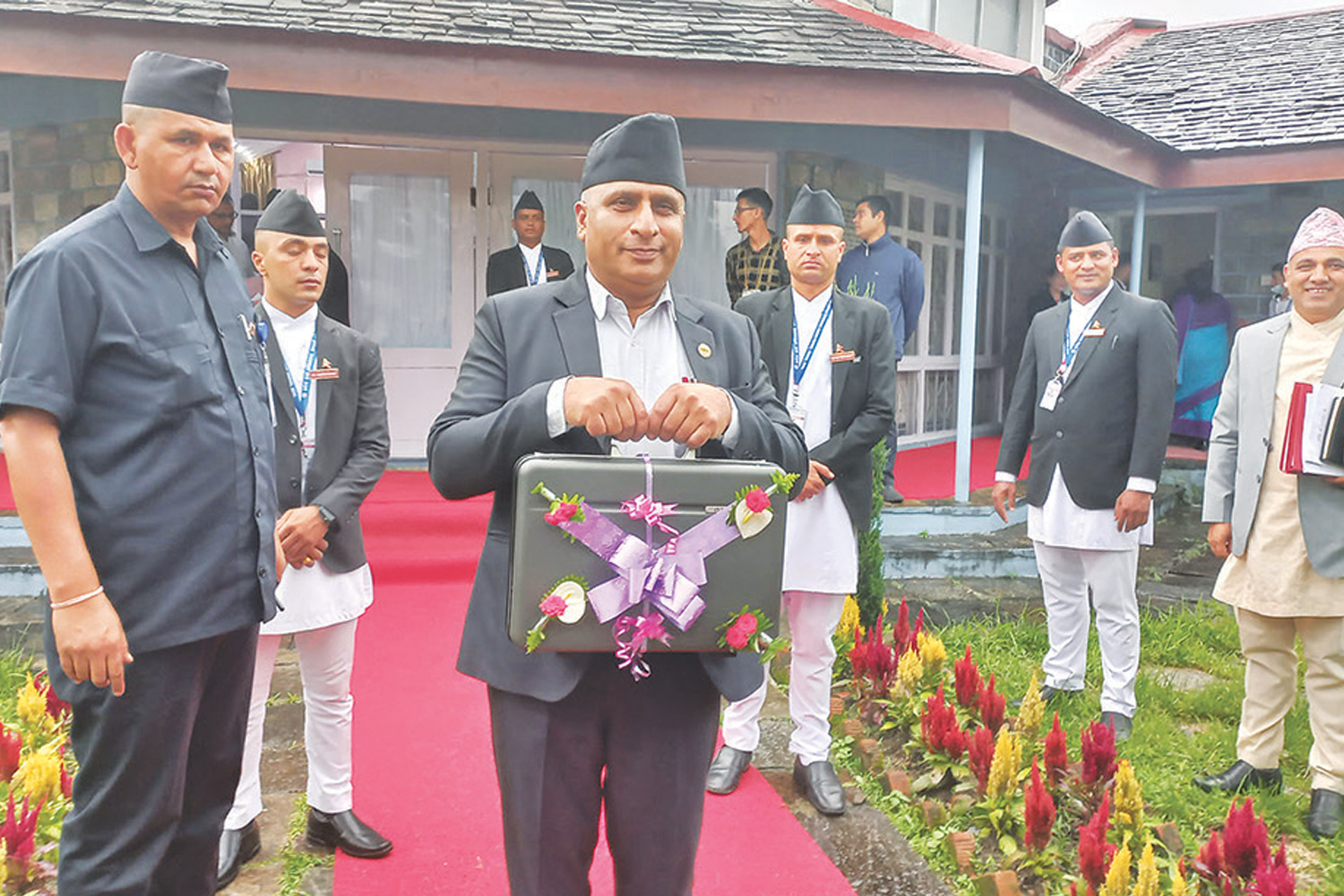
Bagmati has the biggest financial outlay of all seven provinces while Karnali presents the smallest financing plan. Source: Provincial budget statements
All seven provinces on Wednesday unveiled their budgets for the next fiscal year 2022-23 beginning mid-July, laying focus on reviving an ailing economy by boosting agricultural production and expanding the social safety net.
Most provinces have set aside a big chunk of their budgets for infrastructure development. This is the last budget of Nepal’s first provincial governments before polls slated for later this year elect a new batch of representatives.
The combined budgets of the seven provinces for the next fiscal year amount to Rs305.46 billion, nearly 17 percent higher than the current fiscal year's budget.
In the previous fiscal year 2019-20, the combined budgets of the provincial governments amounted to Rs264.20 billion, which decreased slightly to Rs262 billion in the current fiscal year 2021-22.
The value of the annual financial plan of Bagmati Province shows the highest increase among all provinces.
In Province 1, provincial Minister for Economic Affairs and Planning Indra Bahadur Angbo presented a Rs39.73 billion budget in the Provincial Assembly.
The Province 1 government has allocated Rs3.67 billion for the health sector, Rs2.59 billion for the agricultural sector, and Rs6.2 billion for irrigation, river management, energy and drinking water. The province has allocated Rs1.13 billion for the promotion of tourism.
The government intends to upgrade the Covid-19 facility at Koshi Hospital in Biratnagar to tackle outbreaks of communicable diseases in the coming days.
The largest allocation of Rs12.41 billion in the budget is for road infrastructure and urban development.
According to Minister Angbo, Rs5 billion has been set aside for the construction of 66 provincial highways, bridges and strategic roads. The provincial government intends to complete most of the projects in the next fiscal year.
To encourage civil servants in the province, they will be given an amount equal to one month’s salary, said Angbo.
A budget has also been allocated for programmes such as increasing the production capacity of the Udayapur Cement Factory and branding domestic alcohol by enacting necessary laws in coordination with the federal government.
Rs900 million has been set aside for the controversial Constituency Infrastructure Development Special Programme. Under this scheme, members of the Provincial Assembly can spend the money for the development of their respective constituencies.
The Madhesh provincial government has presented a budget of Rs46.88 billion for the next fiscal year, which is 39 percent higher than the budget for the ongoing fiscal year. The provincial budget is mostly focused on promoting social and gender equality.
Finance Minister Shailendra Prasad Sah of Madhesh Province said Rs25.82 billion has been set aside for capital expenditure and Rs21.73 billion for current expenditure.
The province has announced giving continuity to the Chief Minister's Beti Padhao, Beti Bachao (Educate the girl child, save the girl child) campaign as part of the social transformation and women's empowerment programme.
Under the campaign, girl students of class 8 will be provided cash to buy bicycles. The funds will be transferred directly to their bank accounts, said Sah. Currently, the provincial government itself has been buying and distributing bicycles to girl students.
The budget has allocated Rs2.74 billion for the agriculture sector and Rs178.4 million for farm mechanisation and modernisation, Sah said.
For the Industry, Tourism and Forest ministries, the provincial government has allocated Rs4.84 billion. The Madhesh provincial government has announced providing direct cash to the poor and people without any sources of income through the "livelihood" scheme. Rs1.5 billion has been allocated for this scheme, said Sah.
To increase the literacy rate of marginalised and educationally disadvantaged groups such as Chamar, Dom, Dusadh, Halkhor and Musahar, and to reduce their school dropout rates, the government has announced depositing Rs2,000 into their bank accounts annually under the Dalit education campaign.
For social development schemes, Madhesh Province has allocated Rs7.80 billion. The highest amount of Rs18.08 billion has been earmarked for physical infrastructure development.

Salikram Jamarkattel, minister for economic affairs and planning of Bagmati Province (left) presents the budget at the Provincial Assembly RSSSalikram Jamarkattel, minister for economic affairs and planning of Bagmati Province, where Kathmandu Valley is situated, presented a budget of Rs70.93 billion for the upcoming fiscal year, which is the highest among all seven provinces.
The budget for the next fiscal year has seen a significant increment from the one for the current fiscal year, which totalled Rs57.72 billion.
While Rs41.56 billion has been earmarked for capital expenditure, Rs19.2 billion has been set aside for recurrent expenditure in Bagmati.
The budget prioritises physical infrastructure, health and education. A sum of Rs3.23 billion has been allocated to the provincial Ministry of Forest and Environment.
According to Jamarkattel, the money will be used to expand forests and for the conservation of wetlands. “Around 15,000 trees will be planted in the hills next fiscal year,” said Jamarkattel.
While Rs830 million has been set aside for the Ministry of Internal Affairs and Law, Rs650 million goes to the Ministry of Industry. A sum of Rs136.5 million will be made available for the construction of industrial areas in Manahari of Makawanpur and Hariharpurgadhi of Sindhuli.
The "one ward, one health clinic" programme has got a funding of Rs182.7 million. Rs30 million has been promised for the ayurvedic medicine production centre in Ratnanagar.
Gandaki Province Finance Minister Ramji Prasad Baral (Jeevan) presented a budget of Rs35.90 billion for the next fiscal year, 20 percent higher than that of the ongoing fiscal year.
Out of the total budget, Rs22.14 billion has been set aside for capital expenditure and Rs13.26 billion for current expenditure.
Baral says the next fiscal year’s budget is focused on increasing crop and livestock production. The budget will announce the minimum support price of farm products, and transportation will be ensured to take farm products from remote areas to the cities, he said.
Gandaki Province has set aside Rs175 million to promote apple farming in the highland areas. The budget has announced promoting electric vehicles (EVs) and setting up charging stations.

Gandaki Province Finance Minister Ramji Prasad Baral holds a briefcase ahead of presenting the budget for the fiscal year 2022-23 in Kaski. RSSLumbini Province unveiled a budget of Rs42.63 billion, giving priority to agriculture, education, health and infrastructure development.
Of the total budget, Rs24.47 billion is for capital expenditure and Rs13.32 billion for recurrent expenditure, according to Krishnadhwaj Khadka, the provincial minister for economic affairs and cooperatives.
A sum of Rs1.69 billion has been allocated for provincial pride projects.
According to Minister Khadka, some new programmes have been introduced in the agriculture, health and social development sectors besides infrastructure development.
Karnali province has announced a Rs32.61 billion budget for the next fiscal year. Out of the total outlay, Rs9.16 billion has been earmarked for recurrent expenditure and Rs19.43 billion for capital expenditure.
The province has laid focus on physical infrastructure, said Karnali provincial Minister for Economic Affairs and Planning Bindaman Bista.
The province has announced implementing the Road Act to prevent accidents by constructing quality roads. The province has allocated Rs10.92 billion for physical infrastructure and urban development.
The province has announced the launch of its "one house, one tap" campaign to provide clean drinking water to the people. The provincial government has announced constructing a trauma centre in Rakam of Dailekh to provide immediate treatment to the people.
The province is vulnerable to road accidents which kill hundreds of people every year. The budget has allocated funds to airlift pregnant women and to provide prompt treatment to people with emergency illnesses from remote areas.
In order to announce a fully literate province, the government has allocated Rs336 million. Under this scheme, the "one local unit, one community school" infrastructure development programme will be launched.
Sudurpaschim Province has announced a budget of Rs36.74 billion for the coming fiscal year. According to provincial Minister for Economic Affairs Prakash Rawal, a sum of Rs12.29 billion has been allocated for recurrent expenditure and Rs24.14 billion for capital spending.
The province has launched a campaign entitled "Self-sufficiency in agriculture: Province’s prosperity" to make the province prosperous through agriculture by increasing production and productivity.
The budget has allocated Rs250 million for the Chief Minister's Agriculture Programme.
A sum of Rs1.67 billion has been allocated for the construction of drinking water infrastructure, Rs750 million for irrigation and farm mechanisation and Rs190 million for integrated settlements for deprived communities.
The province has set aside Rs5.60 billion for road infrastructure, Rs1.62 billion for the improvement of health services and Rs1.23 billion for the education sector.













